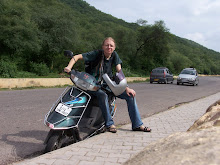From the "The Times of India", Jaipur, 28/02/2009After having succeeded in influencing the state government to ban all kinds of mining operations in the spiritually and culturally significant Deeg and Kaman tehsils of Bharatpur, the Braj Foundation have embarked upon yet another mission.
According to chief executive officer of the foundation Vineet Narain, "The ban on mining in the Rajasthan portion of Braj region is just the beginning. There is an immense need for the preparation of a comprehensive
tourism master plan for the entire region so that the economic fallout can be mitigated through enhanced tourism activities and the ravaged hills can be restored back to their glory." The foundation has recently prepared a comprehensive tourism master plan for the
Uttar Pradesh part of Braj region. The plan has been duly approved by the Uttar Pradesh government.
Narain and his team would be meeting chief minister Ashok Gehlot and would be impressing upon him the need of developing a comprehensive master plan for the Braj region lying within Rajasthan so that the bulk of tourists visiting the Keoladeo National Park at Bharatpur and the Sariska Tiger Reserve at Alwar can be attracted to the exotic heritage hills of Braj as well.
"Due to our sustained campaign, the townships of Deeg and Kaman had been declared as heritage cities. Signages had also been installed at major sites of attraction. But there doesn't exist any plan or policy for developing these heritage sites. Whatsoever little tourism exists in the region is either religious tourism," said Narain. "The need of the hour is to recognise the cultural importance and spiritual significance of the innumerable villages lying in the region and to boost a multi-dimensional tourism" he added.
.JPG) Jhulan Yatra at Radha Govindadevji Mandir in Jaipur started almost 2 weeks ago and every day Thakurji is enjoying the festival. All other Jaipur temples started their celebrations on consecutive days. All the way up to purnima there will be special darshans of the Lord, which have been even advertised through the local newspapers. The Govindaji temple moved the last darshan time 30 minutes later - 9.30pm till 10pm, and every day a Bengali kirtan mandali plays amazing bhajans for the pleasure of Govindadev and His devotees.
Jhulan Yatra at Radha Govindadevji Mandir in Jaipur started almost 2 weeks ago and every day Thakurji is enjoying the festival. All other Jaipur temples started their celebrations on consecutive days. All the way up to purnima there will be special darshans of the Lord, which have been even advertised through the local newspapers. The Govindaji temple moved the last darshan time 30 minutes later - 9.30pm till 10pm, and every day a Bengali kirtan mandali plays amazing bhajans for the pleasure of Govindadev and His devotees.
.JPG) Evening darshan at 9.30pm.
Evening darshan at 9.30pm..JPG) Evening darshan at 9.30pm.
Evening darshan at 9.30pm.

 And here is a joyful and long awaited moment! I have missed my own graduation ceremony, hence I am relishing the photos. Can you play frizzby with these hats? I am back in India, recharging my energy for a bit more academic work out ahead of me. In October I am due to go back to London to start MA in Religion, where I will continue with Hindi and also learn Urdu. Blessings please!
And here is a joyful and long awaited moment! I have missed my own graduation ceremony, hence I am relishing the photos. Can you play frizzby with these hats? I am back in India, recharging my energy for a bit more academic work out ahead of me. In October I am due to go back to London to start MA in Religion, where I will continue with Hindi and also learn Urdu. Blessings please!



